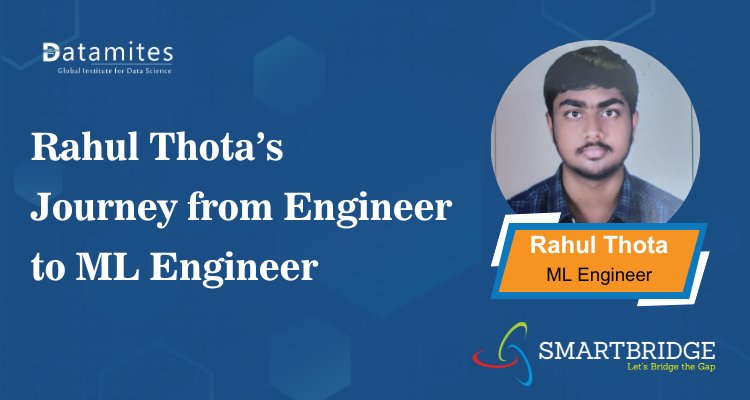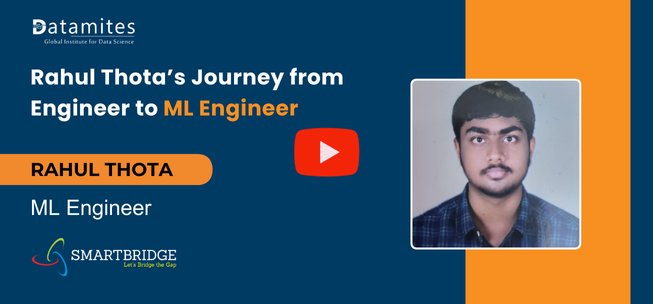From Engineer to ML Engineer: Rahul Thota’s Inspiring Journey
Rahul Thota’s journey from a traditional engineering background to becoming a successful Machine Learning (ML) Engineer is a powerful example of career transformation in the era of artificial intelligence.

Have you ever wondered what it really takes to break into the world of data science? For Rahul Thota, it wasn’t just a career switch—it was a transformation driven by passion, perseverance, and purpose. In a landscape flooded with data and opportunity, Rahul’s journey stands out as a powerful example of how dedication and the right guidance can turn an aspiring learner into a thriving data professional.
How Rahul Thota Became an ML Engineer as a Fresher
Rahul shares his experience, learning strategies, and valuable insights on how he successfully broke into the field of data science. If you're an aspiring data scientist, this Q&A-style feature is filled with practical tips and motivation to guide your journey.
Q1: Rahul, can you tell us about your background before entering the data science field?
Sure! I completed my engineering degree in Electronics and Communication in 2023. During my college years, I developed a deep interest in mathematics and data. As I observed the rising demand for data science, I became curious about how mathematical concepts apply to data analysis. That sparked my desire to explore the field further and eventually build a career in data science.
Q2: When did you decide to take the plunge into a data science career?
While I was still pursuing engineering, I started researching data science on my own. After graduation, I began actively looking for structured learning options and came across DataMites Certified Data Analyst course. Their comprehensive curriculum and support system convinced me to enroll. That’s when my real data science journey began.
Q3: What was your proficiency level in statistics and programming before starting the course?
To be honest, I was at a basic level in both statistics and programming. Though I had some exposure to C and Python during engineering, it wasn’t deep enough. I started learning everything from scratch. The course from DataMites made it easy to understand the fundamentals of statistics and Python required for data analysis.
Q4: How long did it take you to become comfortable with the core topics like Python and statistics?
It took me about a month or so to get a good grasp on the fundamentals. Since the course content was well-structured and the instructors explained everything clearly, I could follow along without difficulty. For someone from a non-technical background, it might take longer, but with commitment, it’s definitely achievable.
Q5: Were you part of the online or classroom batch, and when did your course begin?
I joined the online batch, which started on May 8th. The course duration was about 3 to 4 months, and after completing the core modules, I worked on live projects provided by DataMites. These projects gave me hands-on experience that proved very useful in my internship.
Q6: Do you believe a 3- to 4-month course is sufficient to land a job in data science?
For someone with a technical background and genuine interest in the field, 3 to 4 months of focused learning is sufficient. However, it depends on individual learning pace. People from non-tech backgrounds may need an additional month or two. Passion and consistency matter more than just the number of study hours.
Q7: Rahul, how many projects did you work on during your learning and placement journey?
I worked on two major projects as part of my internship program with DataMites, one Excel-based data analysis project and another focused on HBO. Additionally, I independently practiced 4 to 5 projects involving machine learning and deep learning concepts. However, it’s not just about the number of projects; the emphasis should be on the quality and complexity of the projects you work on.
Q8: Was your current job offer from your first interview attempt?
No, it was actually my second interview. I couldn’t clear the first one, but it taught me some valuable lessons, especially the importance of being prepared for aptitude questions in addition to technical ones.
Q9: What did you learn from your first interview experience that helped in your second one?
In the first interview, I realized I needed to strengthen my aptitude skills. While I was able to answer questions related to datasets and data analysis, I struggled a bit with aptitude questions. I worked on that area and was better prepared for my second interview, where I was able to confidently handle both machine learning and data-related questions.
Q10: How did the placement process at DataMites support you?
The placement process at DataMites was very straightforward. After completing my internship and projects, I was cleared for interviews. The team sent me job openings via email and asked for my interest. I applied to almost all of them. They scheduled interviews and guided me through the process. Their support, especially in resolving queries and follow-ups, was fantastic and helped me land the job I have now.
Q11: There’s a belief that freshers can’t get jobs in data science. What’s your view on this?
That’s a myth. It’s true that many companies ask for experience, but in data science, you can build your own experience by working on real projects—many of which are available on platforms like Kaggle and GitHub. These projects help you gain the practical knowledge that employers look for.
Q12: Rahul, what advice do you have for freshers struggling to land a data science job?
The key is not to give up. Many people reach out saying they haven’t found a job even after months of trying. The problem usually lies in a few areas—your resume may lack the right keywords, or you may be failing initial interview rounds due to knowledge gaps. Work on projects, build a strong data portfolio, and focus on your weaknesses. Keep learning and improving. If a full-time role seems far, take up internships. Even unpaid ones offer learning opportunities and hands-on experience. Eventually, the right job will come.
Q13: Did mock interviews play a role in your preparation?
Absolutely. DataMites arranged mock interviews for me, which included both technical and HR rounds. The feedback I received helped me understand where I stood. Initially, my performance was moderate—not too bad, not too great. But I used the feedback to work on my weak areas. It was a critical part of my preparation and boosted my confidence.
Q14: Which company did you get placed in, and what is your current job role?
I’m currently working at SmartBridge, which is a dynamic and fast-growing startup. It may be considered a startup, but it has significant presence and potential. I’ve joined the organization as an ML Engineer, which is a solid entry-level role in the data science industry. This position allows me to work closely with real-world machine learning projects, and it’s been a fantastic start to my professional career.
Q15: What advice would you give to freshers aiming to enter data science?
My advice would be:
1. Engage in Practical Projects:
Working on real-world projects is one of the most effective ways to build confidence and become job-ready. Each completed project enhances your problem-solving skills and showcases your ability to apply theoretical knowledge in practical scenarios.
2. Establish a Strong Data Portfolio:
Maintain active profiles on platforms like Kaggle and GitHub. Regularly upload your code, explore open-source projects, and participate in community discussions. A well-documented online presence reflects your continuous learning and dedication to the field.
3. Gain Hands-On Experience Through Internships:
Look for internship opportunities that mirror real industry challenges. These experiences, such as those provided by various data science programs, can significantly boost your resume and help you stand out to potential employers.
Key Findings from the Rahul Thota Transition into Data Science
Job Placement at SmartBridge:
- Rahul secured a role as a Machine Learning Engineer at SmartBridge, a startup company.
- He expressed satisfaction with the company and the support provided during the placement process.
- The Placement Assistance Team at DataMites played a crucial role in helping Rahul get connected to the opportunity he was interested in.
Typical Hiring Process for Data Science Roles:
- Technical interview focusing on core knowledge.
- A second technical round.
- An HR round discussing company culture and compensation.
Career Guidance for Freshers:
- New professionals are encouraged to take on multiple projects and workloads early in their careers.
- A strong learning attitude is essential due to the rapidly evolving nature of data science tools and frameworks.
Appreciation and Support:
- Rahul extended heartfelt thanks to the DataMites team, especially the placement support team.
- He acknowledged their critical role in helping him transition successfully into the data science industry.
Refer these below articles:
- Is There Still a High Demand for Artificial Intelligence in Pune?
- Is There a Growing Demand for Artificial Intelligence in Hyderabad?
- Is There Still a High Demand for Artificial Intelligence in Bangalore?
Rahul Thota’s inspiring journey into the data science field is a testament to the power of consistent learning, practical exposure, and the right mentorship. His successful placement as a Machine Learning Engineer at SmartBridge highlights how DataMites not only provided him with top-notch training but also offered strong placement support through initiatives like the PAT team.
Artificial Intelligence is no longer a futuristic concept, it is a powerful force that is actively transforming industries, economies, and our daily lives. With its rapid advancement, AI is revolutionizing sectors such as healthcare, finance, education, and manufacturing. According to Statista, the global artificial intelligence market was valued at USD 142.3 billion in 2023 and is projected to reach USD 1.81 trillion by 2030, growing at a remarkable CAGR of 37.3%. In response to this exponential growth, many aspiring professionals are enrolling in Artificial Intelligence courses in Bangalore to gain practical experience and stay ahead in this dynamic and competitive field.
DataMites is a globally recognized training institute that specializes in data science, artificial intelligence, machine learning, Python programming, and other emerging tech domains. Accredited by prestigious bodies such as IABAC and NASSCOM, DataMites offers flexible learning options, including online and offline classroom training.
With a presence in key Indian cities, DataMites offers offline artificial intelligence courses in Chennai, Bangalore, Hyderabad, Pune, Mumbai, Kolkata, Delhi, Ahmedabad, and Coimbatore. Having trained over 1,00,000 learners worldwide, DataMites provides the ideal combination of theoretical knowledge and practical experience. Whether you're a beginner entering the world of AI or a professional seeking to advance your skills, DataMites is equipped to fast-track your career in data and artificial intelligence.

